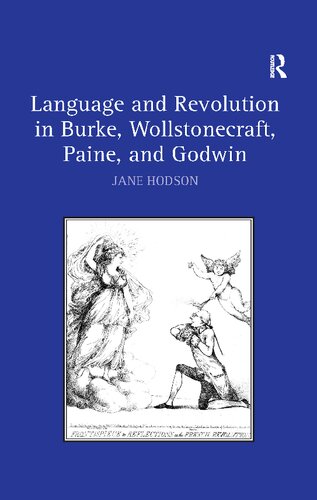

Most ebook files are in PDF format, so you can easily read them using various software such as Foxit Reader or directly on the Google Chrome browser.
Some ebook files are released by publishers in other formats such as .awz, .mobi, .epub, .fb2, etc. You may need to install specific software to read these formats on mobile/PC, such as Calibre.
Please read the tutorial at this link. https://ebooknice.com/page/post?id=faq
We offer FREE conversion to the popular formats you request; however, this may take some time. Therefore, right after payment, please email us, and we will try to provide the service as quickly as possible.
For some exceptional file formats or broken links (if any), please refrain from opening any disputes. Instead, email us first, and we will try to assist within a maximum of 6 hours.
EbookNice Team

Status:
Available0.0
0 reviews
ISBN 10: 0754654036
ISBN 13: 9780754654032
Author: Jane Hodson
The Revolution in France of 1789 provoked a major 'pamphlet war' in Britain as writers debated what exactly had happened, why it had happened, and where events were now headed. Jane Hodson's book explores the relationship between political persuasion, literary style, and linguistic theory in this war of words, focusing on four key texts: Edmund Burke's Reflections on the Revolution in France, Mary Wollstonecraft's A Vindication of the Rights of Men, Thomas Paine's Rights of Man, and William Godwin's Enquiry Concerning Political Justice. While these texts form the core of Hodson's project, she ranges far beyond them to survey other works by the same authors; more than 50 contemporaneous books on language; and pamphlets, novels, and letters by other writers. The scope of her study permits her to challenge earlier accounts of the relationship between language and politics that lack historical nuance. Rather than seeing the Revolution debate as a straightforward conflict between radical and conservative linguistic practices, Hodson argues that there is no direct correlation between a particular style or linguistic concept and the political affiliation of the writer. Instead, she shows how each writer attempts to mobilize contemporary linguistic ideas to lend their texts greater authority. Her book will appeal to literature scholars and to historians of language and linguistics working in the Enlightenment and Romantic eras.
1 The Language of Politics and the Politics of Language
The Language of Politics
The Politics of Language
Case Study: John Horne Tooke and Lindley Murray
The Author’s Reputation
The Author’s Concept of Language
Intended Audience
Examples
Practical Political Effects of the Text
Summary
Language and Revolution
2 The Linguistic Background
Principles of Selection
An Overview of the Texts
Stylistic Prescription in the 1790s
Poetry, ‘Primitive’ Language, and Letters
Conclusion
3 ‘A Wilderness of Words’: Edmund Burke’s Reflections
Modern Criticism
Contemporary Reviews
Twenty Years Earlier: Thoughts
Contemporary Views of ‘Connection’
Case Study: Connection in Thoughts and Reflections
Comparison of Two Short Passages
Conjunctions
Amplification
Burke’s Concept of Language
4 ‘The Effusions of the Moment’: Mary Wollstonecraft’s Vindication
Modern Criticism
Contemporary Reviews
Contemporary Views of Exclamations, Questions and Dashes
Case Study: Exclamations, Questions and Dashes
Wollstonecraft on Language
Wollstonecraft’s Attack on Burke
Sincerity and Artifice
5 ‘What is this Metaphor called a Crown?’: Thomas Paine’s Rights of Man
Modern Criticism
Contemporary Reviews
Contemporary Views of Literary ‘Ornament’
Case Study: Rhetorical Tropes in Reflections and Rights of Man
Paine’s Philosophy of Language?
6 ‘The Transparent Envelop of our Thoughts’: Godwin’s Political Justice
Modern Criticism
Contemporary Reviews
Case Study: Pedantic Structure and Affected Words
Reason
Sense
The Role of Language in Political Justice
‘Of English Style’
7 Conclusion
burke language as symbolic action
burke reflections on the revolution in france pdf
burke reflections on the revolution in france text
burke revolution in france summary
burke languages
burke revolutionary writings
Tags: Jane Hodson, Language, Revolution